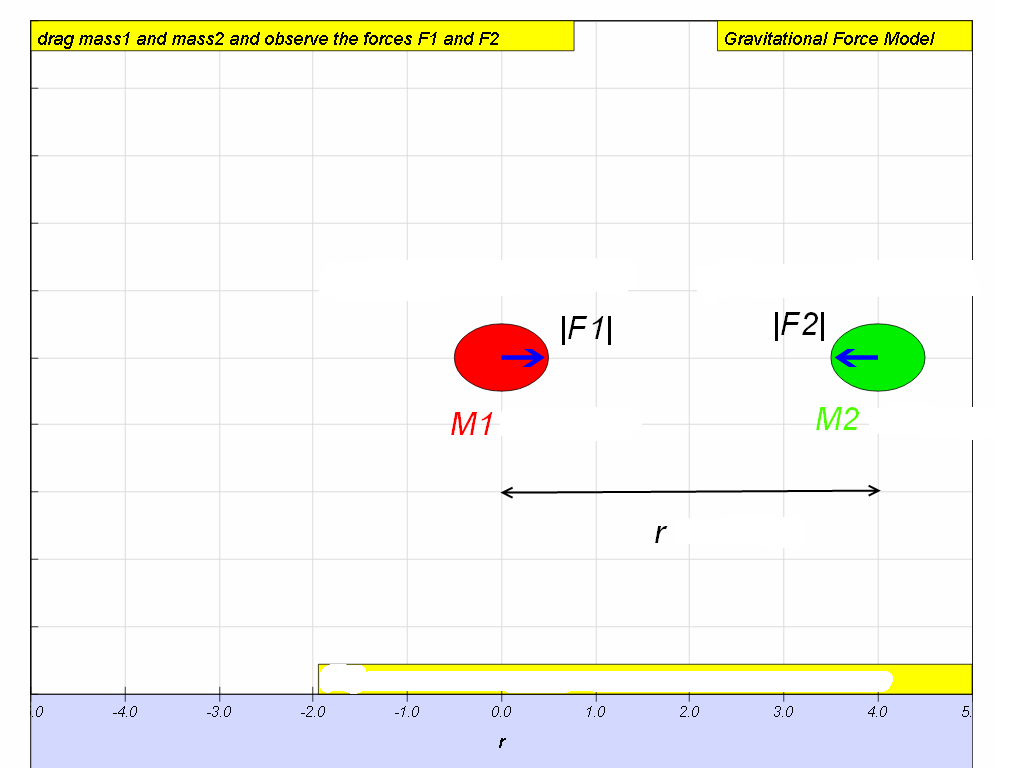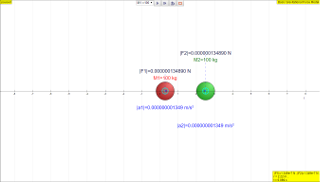About
7.1 Newton’s Law of Gravitation
Gravitation is a natural phenomenon by which physical bodies attract each other due to their masses. This force occurs whenever masses are present and the two bodies need not to be in contact with each other. It is however the weakest of the fundamental forces of nature.
In 1687, Sir Isaac Newton concluded that this non-contact gravitational force must be as responsible for the falling of the apple from a tree as it is the cause for the rotation of the Moon about the Earth. Hence he published the Newton’s law of gravitation which states that:
“The mutual force of attraction between any two point masses is directly proportional to the product of their masses and inversely proportional to the square of the separation between their centres.”

This means that if there are two point masses M and m and they are separated by distance r, the magnitude of the gravitational force attracting them to each other is where G, the constant of universal gravitation, is (will be given in data & formulae list during tests and examinations).
Note:
1. r is taken to be the centre to centre distance (i.e. centre of particle to centre of particle). Do not take r to be the radius of orbit!
2. This formula is an example of the inverse square law.
7.1.1 Inquiry:
What can you conclude about the two forces in the simulation below?Answer: Based on the evidences from the simulation triangulated with real life examples, the mutual force of attraction between any two point masses is directly proportional to the product of their masses and inversely proportional to the square of the separation between their centres.
7.1.2 Model:
Translations
| Code | Language | Translator | Run | |
|---|---|---|---|---|
 |
||||
Credits


![]()
 This email address is being protected from spambots. You need JavaScript enabled to view it.; Anne Cox; Wolfgang Christian; Francisco Esquembre
This email address is being protected from spambots. You need JavaScript enabled to view it.; Anne Cox; Wolfgang Christian; Francisco Esquembre
Briefing Doc: Gravity Model and Newton's Law of Gravitation
Source: Excerpts from "7.1.3 Gravity Model Example JavaScript HTML5 Applet Simulation Model - Open Educational Resources / Open Source Physics @ Singapore"
Main Themes:
- Newton's Law of Gravitation: The document focuses on explaining Newton's Law of Gravitation, which describes the attractive force between any two objects with mass.
- Gravitational Force: The document explores the concept of gravitational force, highlighting its presence in various phenomena like the falling of an apple or the moon's orbit around the earth.
- Inverse Square Law: The document emphasizes that gravitational force follows an inverse square law, meaning the force weakens with the square of the distance between objects.
Most Important Ideas/Facts:
- Definition of Gravitation: "Gravitation is a natural phenomenon by which physical bodies attract each other due to their masses. This force occurs whenever masses are present and the two bodies need not to be in contact with each other."
- Newton's Law of Gravitation: "“The mutual force of attraction between any two point masses is directly proportional to the product of their masses and inversely proportional to the square of the separation between their centres.”"
- Formula for Gravitational Force: “|F|= G M₁M₂/r²” where:
- F is the magnitude of the gravitational force
- G is the gravitational constant (6.67 x 10^-11 N m²/kg²)
- M₁ and M₂ are the masses of the two objects
- r is the distance between their centers
- Key Points about the Formula:"r is taken to be the centre to centre distance (i.e. centre of particle to centre of particle). Do not take r to be the radius of orbit!"
- "This formula is an example of the inverse square law."
Interactive Simulation:
The document links to an interactive simulation (https://iwant2study.org/lookangejss/02_newtonianmechanics_7gravity/ejss_model_gravity01_1/gravity01_1_Simulation.xhtml) which allows users to visualize and explore the relationship between mass, distance, and gravitational force.
Conclusion:
This document provides a concise and clear explanation of Newton's Law of Gravitation, highlighting its key principles and providing an interactive tool for further understanding. It serves as a valuable educational resource for individuals seeking to learn about this fundamental law of physics.
Gravity and Newton's Law of Gravitation Study Guide
Instructions: Answer the following questions in 2-3 sentences each.
- State Newton's Law of Gravitation in your own words.
- What is the significance of the "inverse square law" in the context of gravitation?
- How does the distance between two objects affect the gravitational force between them?
- What role does the gravitational constant (G) play in calculating gravitational force?
- Why is gravitation considered the weakest of the four fundamental forces?
- Explain the concept of a "point mass" and its relevance to Newton's Law of Gravitation.
- Differentiate between "r" as the center-to-center distance and the radius of orbit.
- How does the mass of an object impact the gravitational force it exerts?
- Provide a real-life example illustrating the effects of Newton's Law of Gravitation.
- What is the purpose of the simulation linked in the provided source material?
Short Answer Quiz Answer Key
- Newton's Law of Gravitation states that every object with mass attracts every other object with mass. The strength of this attraction is directly proportional to the product of their masses and inversely proportional to the square of the distance between their centers.
- The "inverse square law" means that the force of gravity weakens rapidly as the distance between two objects increases. Specifically, if the distance doubles, the force becomes four times weaker.
- As the distance between two objects increases, the gravitational force between them decreases. This relationship follows the inverse square law.
- The gravitational constant (G) is a proportionality constant that scales the calculated gravitational force. It ensures that the units of the equation are consistent and represents the inherent strength of the gravitational interaction.
- Gravitation is the weakest fundamental force because the value of the gravitational constant (G) is incredibly small. Compared to forces like the electromagnetic force or the strong nuclear force, gravity's influence is much weaker at the atomic and subatomic levels.
- A "point mass" is a simplification used in physics where the entire mass of an object is considered to be concentrated at a single point. This simplifies calculations in Newton's Law of Gravitation, especially when dealing with spherical objects.
- "r" in Newton's Law of Gravitation refers to the distance between the centers of two objects. This is different from the radius of orbit, which is the distance between an orbiting object and the center of the object it orbits.
- The greater the mass of an object, the stronger the gravitational force it exerts on other objects. This is a direct proportionality relationship as described in Newton's Law of Gravitation.
- The Earth orbiting the Sun is a classic example of Newton's Law of Gravitation. The Sun's large mass exerts a strong gravitational force on Earth, keeping it in orbit.
- The simulation visually demonstrates Newton's Law of Gravitation by allowing users to manipulate the masses and distances of objects and observe the resulting changes in gravitational force.
Essay Questions
- Describe the historical context leading up to Newton's formulation of the Law of Universal Gravitation. Discuss the contributions of scientists who came before him and how their work influenced Newton’s thinking.
- Explain the concept of a gravitational field. How does it relate to the force of gravity and the concept of gravitational potential energy?
- How does Newton's Law of Gravitation apply to the motion of planets in our solar system? Discuss Kepler’s laws of planetary motion and their relationship to Newton’s work.
- Discuss the limitations of Newton's Law of Gravitation. When does it break down, and what theories have emerged to address these shortcomings?
- Choose a real-world application of Newton's Law of Gravitation, such as satellite technology, tides, or black holes, and explain in detail how the law governs the observed phenomena.
Gravity FAQ
1. What is gravitation?
Gravitation is a fundamental force of nature that causes all objects with mass to attract one another. This attraction exists regardless of whether the objects are in contact.
2. What is Newton's Law of Gravitation?
Newton's Law of Gravitation states that the force of attraction between two point masses is:
- Directly proportional to the product of their masses: The more massive the objects, the stronger the gravitational force.
- Inversely proportional to the square of the distance between their centers: The farther apart the objects, the weaker the gravitational force.
3. What is the formula for calculating gravitational force?
The formula for gravitational force is:
F = G * (M1 * M2) / r²
Where:
- F is the force of gravity
- G is the universal gravitational constant (6.67 x 10⁻¹¹ N m²/kg²)
- M1 and M2 are the masses of the two objects
- r is the distance between the centers of the two objects
4. What is the significance of the "inverse square law" in gravitation?
The inverse square law means that the force of gravity weakens rapidly as the distance between objects increases. Doubling the distance between objects reduces the gravitational force to one-fourth of its original strength.
5. What is the role of the universal gravitational constant (G)?
The universal gravitational constant (G) is a fundamental constant that determines the strength of the gravitational force. Its value is the same throughout the universe.
6. How does the distance between objects affect the gravitational force?
The force of gravity is inversely proportional to the square of the distance between the centers of the objects. This means that as the distance increases, the force decreases rapidly.
7. What is the relationship between gravitational force and the masses of objects?
The force of gravity is directly proportional to the product of the masses of the two objects. This means that as the mass of either object increases, the force of gravity also increases.
8. Can you provide an example of how Newton's Law of Gravitation is observed in everyday life?
One example is the Earth's gravity keeping us on the ground. The large mass of the Earth exerts a strong gravitational force on us, attracting us towards its center. This force is what we experience as our weight.
- Details
- Written by Loo Kang Wee
- Parent Category: 02 Newtonian Mechanics
- Category: 08 Gravity
- Hits: 9805








